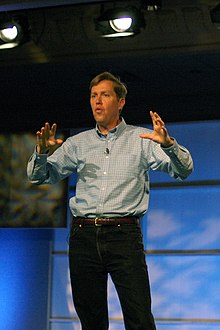Jeff Hawkins
American entrepreneur and neuroscientist; founder of Palm Computing
Jeffrey Hawkins (born June 1, 1957) is the founder of Palm Computing (where he invented the Palm Pilot) and Handspring (where he invented the Treo). He subsequently turned to work on neuroscience, founding the Redwood Center for Theoretical Neuroscience in 2002. In 2005 he founded Numenta, where he leads a team in efforts to reverse-engineer the neocortex and enable machine intelligence technology based on brain theory.

Quotes
edit- If you look at the history of big obstacles in understanding our world, there's usually an intuitive assumption underlying them that's wrong. In the case of the Solar System it was intuitively obvious that the Earth was at the center of the Solar System and things moved around us, but that just turned out to be wrong. … And it intuitively seems correct that the brain is just some sort of computer—it just seems natural. … But it has undermined almost all of our work to build intelligent machines and understand thinking. It's just wrong … the brain isn't like a computer at all.
- The key to artificial intelligence has always been the representation. You and I are streaming data engines.
- The New York Times: Jeff Hawkins Develops a Brainy big data Company (28 November 2012)
- I do two things: I design mobile computers and I study brains.
- Jeff Hawkins at TED2003: "How brain science will change computing" (February 2003)
On Intelligence (2004)
editJeff Hawkins, Sandra Blakeslee, On Intelligence: How a New Understanding of the Brain Will Lead to the Creation of Truly Intelligent Machines, 2004; 2007
- Deep Blue didn't win by being smarter than a human; it won by being millions of times faster than a human. Deep Blue had no intuition. An expert human player looks at a board position and immediately sees what areas of play are most likely to be fruitful or dangerous, whereas a computer has no innate sense of what is important and must explore many more options. Deep Blue also had no sense of the history of the game, and didn't know anything about its opponent. It played chess yet didn't understand chess, in the same way a calculator performs arithmetic bud doesn't understand mathematics.
- p. 17-18: First part of quote refers to the six-game re-match with world champion Garry Kasparov in 1997.
- ... intelligence is not just a matter of acting or behaving intelligently. Behavior is a manifestation of intelligence, but not the central characteristic or primary definition of being intelligent. A moment's reflection proves this: You can be intelligent just lying in the dark, thinking and understanding. Ignoring what goes on in your head and focusing instead on behavior has been a large impediment to understanding intelligence and building intelligent machines
- p. 29
- The brain is an organ that builds models and makes creative predictions, but its models and predictions can as easily be specious as valid. Our brains are always looking at patterns and making analogies. If correct correlations cannot be found, the brain is more than happy to accept false ones. Pseudoscience, bigotry, faith, and intolerance are often rooted in false analogy.
- p. 193
A Thousand Brains (2021)
editJeff Hawkins. A Thousand Brains: A New Theory of Intelligence, 2021.
- The cells in your head are reading these words. Think how remarkable that is.
- p. 13
Quotes about Hawkins
edit- Jeff Hawkins ... has served as inspiration to countless AI researchers, for which I give him a lot of credit.
- Andrew Ng in The Register: "Meet the man building an AI that mimics our neocortex – and could kill off neural networks" (29 March 2014)
- Palm founder Jeff Hawkins used to carry around a wooden mock-up of the PalmPilot to show what a smart device could look like, thus communicating his vision of the future.
- Madanmohan Rao in YourStory: "‘Every startup is a moonshot’ – how to use moonshot principles to galvanise innovation and achieve bold targets" (8 June 2018)